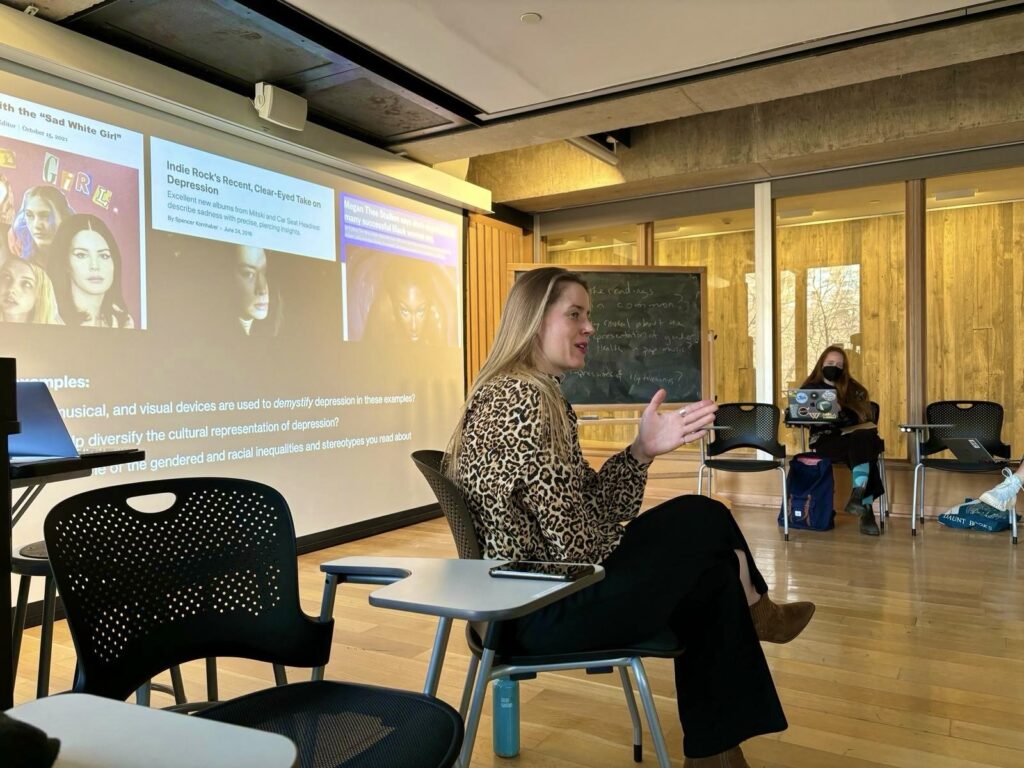As part of the podcast series, “ArtsAbly in Conversation,” Diane Kolin interviewed Dr. Jessica Holmes, Assistant Professor of Musicology at the University of Copenhagen. Her research analyzes the representation of disability in contemporary Western popular music, with emphasis on vocality, embodiment, and identity formation.

This post presents the resources that she mentioned during the conversation.
Dr. Jessica Holmes’ academic page
Jessica A. Holmes is Assistant Professor of Musicology in the Department of Arts and Cultural Studies at the University of Copenhagen where she teaches courses in popular music studies and musicology, and serves as founding leader of the UCPH “Art & Health” interdisciplinary research cluster. From 2020-21, she served as Departmental Lecturer of Musicology in the Herb Alpert School of Music at the University of California, Los Angeles (UCLA), having previously held the position of inaugural Postdoctoral Fellow of Musicology at UCLA from 2017-2020, for which she received the 2019 UCLA Chancellor’s Award for Postdoctoral Research, the highest university-wide distinction for Postdoctoral Fellows from across the sciences and humanities. Jessica holds a Ph.D. in Musicology from McGill University, where she was a 2012-15 Fellow of the Vanier Canada Graduate Scholarship, Canada’s most competitive federally-funded scholarship for doctoral students.
This page gives her research overview and summarizes her two book projects currently in process.
Visit Dr. Jessica Holmes’ page
Christine Sun Kim
Christine Sun Kim is an American sound artist based in Berlin. Working predominantly in drawing, performance, and video, Kim’s practice considers how sound operates in society. Musical notation, written language, American Sign Language (ASL), and the use of the body are all recurring elements in her work. She has been profoundly deaf since birth. She has a Master of Fine Arts in Visual Art from the School of Visual Arts in New York, and another in Sound and Music from Bard College. Kim investigates the operations of sound and various aspects of Deaf culture in her performances, videos, and drawings. In developing her personal visual language, Kim draws from a variety of information systems. She uses elements from these systems such as body language, ASL, musical and graphic notation, and language interpretation, inventing new structures for her compositions and extending each source’s scope of communication. She further uses sound to explore her own relationship to verbal languages and her environment. Through her work, she gains control of voice and sound, seeking to release them from social conventions.
Visit Christine Sun Kim’s website
Read more about Christine Sun Kim’s Face Opera
Evelyn Glennie
Dame Evelyn Glennie is a Scottish percussionist. She has been profoundly deaf since the age of 12, having started to lose her hearing at the age of 8. This does not inhibit her ability to perform. She regularly plays barefoot during live performances and studio recordings to feel the music. Glennie contends that deafness is largely misunderstood by the public. She explains that her teacher Ron Forbes helped her feel the music using other parts of her body. She felt the upper drum from the waist up and the lower drum from the waist down. On her website Glennie published her “Hearing Essay” in which she discusses her listening practice. Glennie also discusses how she feels music in different parts of her body in her TED talk “How To Truly Listen”, published in 2003, and a collection of her speeches and writings are published in her book Listen World!.
Visit Evelyn Glennie’s website
Watch the TED Talk “How To Truly Listen”
Monica Germino
Monica Germino (born 1974) is an American and Dutch violinist. She is a graduate of Yale and the New England Conservatory. She commissioned a Violectra (electric violin) in 2003, and collaborates with “electronic sound designer” Frank van der Weij. Together, they have commissioned numerous new works for violinist and sound designer.
Visit Monica Germino’s webiste
Read more about Monica Germino and her whisper violin
Joni Mitchell
Joni Mitchell is a Canadian-American singer-songwriter, multi-instrumentalist, and painter. She is widely considered one of the greatest singer-songwriters of all time. As one of the most influential singer-songwriters to emerge from the 1960s folk music circuit, Mitchell became known for her personal lyrics and unconventional compositions which grew to incorporate pop and jazz elements. She has received many accolades, including eleven Grammy Awards and induction into the Rock and Roll Hall of Fame in 1997. Rolling Stone called her “one of the greatest songwriters ever”, and AllMusic has stated, “Joni Mitchell may stand as the most important and influential female recording artist of the late 20th century.” Mitchell contracted polio at age nine. Polio had weakened her left hand, but it didn’t prevent her from teaching herself guitar from a Pete Seeger songbook. She devised alternative tunings to compensate, and she later used these tunings to create nonstandard approaches to harmony and structure in her songwriting.
Blake Howe
Blake Howe is the Paula G. Manship Professor of Musicology at Louisiana State University. He teaches courses and seminars on eighteenth- and nineteenth-century music, film music, and performance practice for graduate students, and introduction and survey courses for undergraduates. His research interests are diverse and include nineteenth-century German song, Disability Studies, and film music. He has published on these and other topics in numerous specialized journals. He is co-editor, with Stephanie Jensen-Moulton, Neil Lerner, Joseph N. Straus, of The Oxford Handbook on Music and Disability Studies (Oxford University Press), and co-convenor of the colloquy “On the Disability Aesthetics of Music” (Journal of the American Musicological Society).
Visit Blake Howe’s academic page
More information about The Oxford Handbook on Music and Disability Studies
Michele Friedner
Professor and Chair of the Department of Comparative Human Development at the University of Chicago, Michele Friedner is a medical anthropologist researching deaf and disabled peoples’ social, moral, religious, and economic practices, with a primary focus on deafness in India. Disability as category and experience have become increasingly salient in the international policy arena and in everyday life. Through individual and collaborative research and writing endeavors, she has worked to place disability and deafness in anthropological and other scholarly conversations about the state, the senses, and urban planning and development, as examples.
Visit Michele Friedner’s academic page
More about Valuing Deaf Worlds in Urban India
Mara Mills
Mara Mills is Associate Professor and Ph.D. Director in the Department of Media, Culture, and Communication at New York University. She is founding co-director of the NYU Center for Disability Studies; a founding editor of the award-winning journal Catalyst: Feminism, Theory, Technoscience; and a founding member of the steering committees for the NYU cross-school minors in Science and Society and Disability Studies. Trained in Biology (BA, MA), Literature (BA), Education (MA), and History of Science (PhD), Mills is an interdisciplinary scholar and teacher in the fields of disability studies, Science and Technology Studies, and sound studies. Her work on “disability and media” spans disability arts and technoscience, with a focus on the history, politics, and cultures of electronics and digital media.

